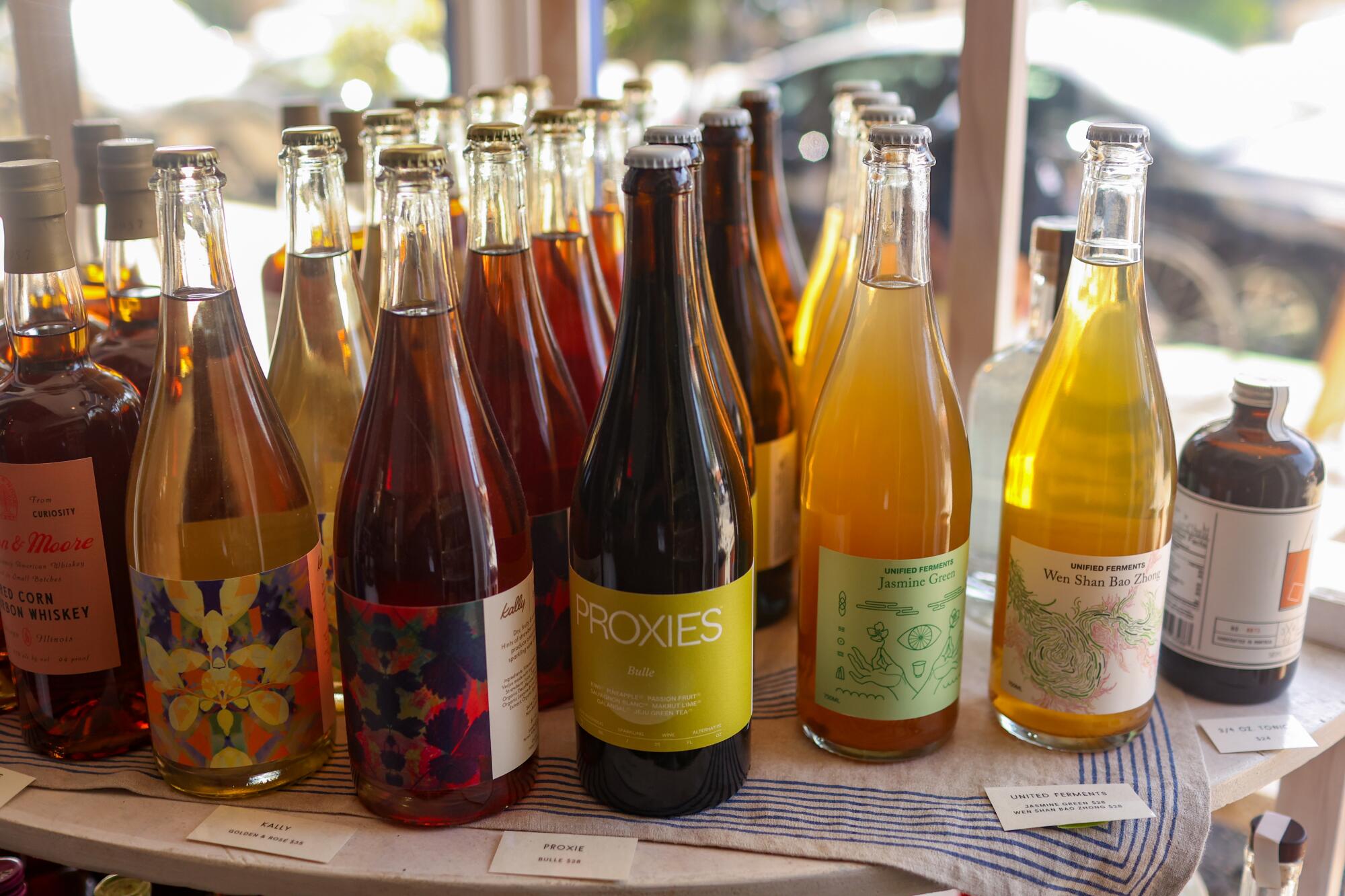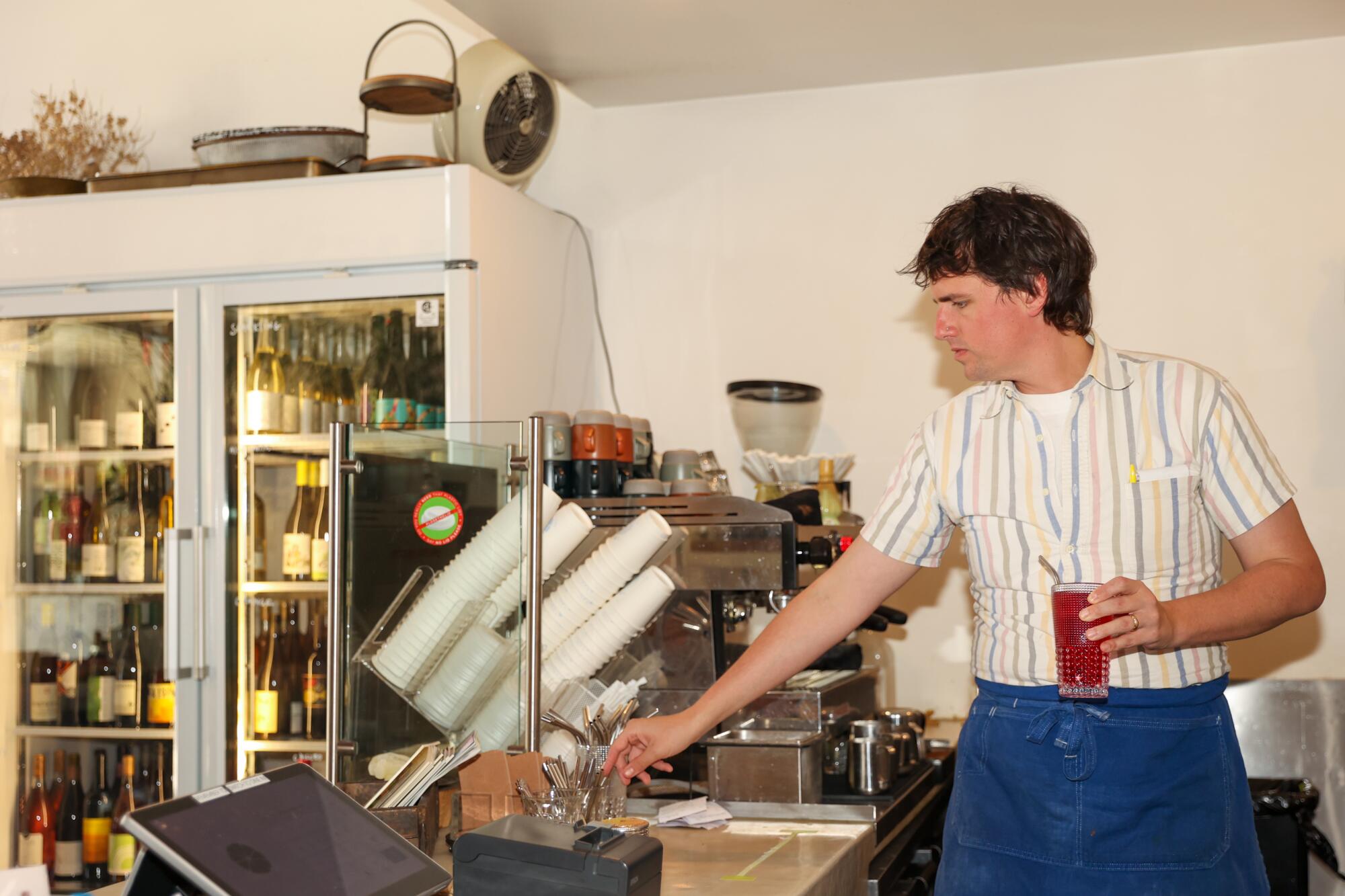Business
Where every cent of $1 goes at one L.A. restaurant, explained

My industry has always been as difficult as it is magical. In the post-pandemic era, challenges are categorically higher.
The threat to restaurants during the pandemic was obvious; it was a given that many wouldn’t come out the other side. In 2024, restaurants are back! No, restaurants are dying! No, restaurants are (sometimes) busy! It is whiplash, day to day.
For many, including my restaurant, Botanica, solvency is more elusive than ever due to the elevated cost of doing business. Since opening Botanica nearly seven years ago, our labor costs have risen 40% for hourly workers and 25% for salaried management, the result of minimum-wage increases and market-rate pay increases. Our rent has risen 17%. Our sales, on the other hand, have grown only 2.3%.
Obviously, this creates a near-impossible status quo. In our industry, there are no mechanisms for alleviating costs other than trimming spending on goods and labor.
In other words: There is no way to balance the books without compromising the quality, vision and values that define a business like ours. There are no tax breaks on costly insurance policies or credit card processing fees. And if we were to pass the costs on to our customers, we’d be compromising the vision and values that make us what we are. It’s an absolute conundrum.
Our way of doing business is under threat. From frequent conversations with restaurateur friends (including my co-founders of Regarding Her, a nonprofit focused on female food-industry leaders), I know that what Botanica is navigating at the moment is far from unique.

Botanica co-owner Heather Sperling at her restaurant in Silver Lake. For many restaurants, “Solvency is more elusive than ever due to the elevated cost of doing business.”
(Michael Blackshire / Los Angeles Times)
Why does this matter? Neighborhood-oriented restaurants are vital to communities and economies. They are meaningful gathering spots and dependable local employers. They support numerous other businesses: cleaners, farmers, coffee roasters, winemakers, equipment technicians, etc. They’re small and personal, and thus are approachable and accountable in ways that larger businesses aren’t. They’re often run by owners and managers who care deeply about their people, their neighborhood and their impact — even more than they care about their bottom line.
I know this because Emily Fiffer (Botanica’s co-owner) and I are among these people. And, moreover, we’re friends with dozens of like-minded owners across L.A. and beyond.
Eating at a place like Botanica might feel indulgent. Dishes on the spring menu range in price from $14 for marinated bean toast $36 for Baja striped bass. But from our perspective, the purpose of our business is not just to provide a nice evening of beautifully prepared, local, sustainable produce and natural wine. Our goal is to run a business with the most positive possible impact on our community, economy and environment — a business that embodies what we call “nourishing hospitality.”
There’s an economic concept called “the multiplier effect,” which describes how the effect of spending is greater than the original money spent. While every dollar you spend ripples through the economy in some way, restaurants surely must provide among the best bang for your buck, so to speak.
So one day I sat down to try to calculate exactly how this works with our model, and I landed on a startling figure.
Of every $1 spent by a customer at Botanica in 2023, $1.005 went back out the door.
Of that, 86.7 cents went toward “the good stuff” — meaning people, businesses and causes that it feels good to be supporting; 53.2 cents pays for the livelihoods of 50 staff members (including insurance, benefits and hefty payroll taxes); 26.2 cents buys products from a sensational web of farmers, purveyors and makers doing ethical, sustainability-focused work, who themselves employ countless passionate individuals; and 7.3 cents pays for a cadre of small businesses in supporting roles: our cleaning crew, florist, laundry services, a cavalcade of local equipment repair people, the family-run supplier of our recyclable and compostable to-go and market packaging, and so on.

Two diners share a spread during tinned-fish happy hour at Botanica restaurant in Silver Lake.
(Michael Blackshire / Los Angeles Times)

The tinned fish display at Botanica. The restaurant also has a market stocked with house-made goods and products from local, largely women-owned businesses.
(Michael Blackshire / Los Angeles Times)
And then 13.8 cents goes to occupancy costs (rent, utilities and trash/recycling/compost pickup); administrative costs (office supplies, our accountant, various apps and tools essential to operations, phone and internet, etc.); and the cost of credit card processing — 3.1 cents I really wish we could spend elsewhere!
The national average profit margin for independent restaurants is regularly cited to be in the zone of 3% to 5% (sometimes higher, often lower). This profit is necessary for retaining staff (raises), reinvesting in infrastructure (endless property and equipment repairs), navigating snafus (a power outage can result in thousands of dollars in losses), and repaying the investors, often friends and family, who funded the venture in the first place.
Botanica closed out 2023 with a 1.19% profit — but not from restaurant operations; those were just slightly less than break-even. Our revenue was boosted by a handful of commercial photo shoots held at the restaurant on days when we were closed.
Granted, Botanica is a more labor-heavy model than many in our cohort. We are open for breakfast, lunch and dinner; we have a robust coffee/tea/bakery program, and the front of our space is a market stocked with natural wine, house-made goods and products from local, largely women-owned businesses. These are laborious undertakings that require substantially more staff (with specialized training, no less) than a dinner-only joint. But these elements of our business, costly as they may be, are the ones that make us an especially useful, multifaceted neighborhood spot.

Botanica is open for breakfast, lunch and dinner. Sperling drops by a table to chat with customers Zal Batmanglij, center, and Blake Holland, right.
(Michael Blackshire / Los Angeles Times)
All this is to say that a restaurant like Botanica — like so many other independent, owner-operated neighborhood restaurants across the country — exists, first and foremost, to nourish its people. Hospitality is innately altruistic, and the neighborhood restaurant is especially, preciously, precariously so.
I don’t have any grand solutions to propose, though I do believe that low-margin, financially uncertain businesses like ours will need structural support to continue to exist. That 3.11% of revenue that goes to credit card processing fees ($98,725 last year, paid to our point-of-sale system, Toast) would be a transformational addition to our bottom line. And I’d vastly prefer to reinvest some of the 4.89% that went to payroll taxes ($155,000 in 2023) into our team.
In the absence of legislated solutions, it comes down to the diners. Nearly 20 years ago, right as I was starting out in the food world, Michael Pollan introduced the concept of “voting with your fork” via his seminal book “The Omnivore’s Dilemma”; it’s his way of succinctly expressing the importance and power that your daily food choices can have.

Botanica’s marketplace also sells natural wines, along with its selection of house-made goods and local products.
(Michael Blackshire / Los Angeles Times)

A server prepares a drink at Botanica. Co-owner Sperling says that since opening the restaurant almost seven years ago, labor costs have risen 40% for hourly workers and 25% for salaried management.
(Michael Blackshire / Los Angeles Times)
I’ve been trying to come up with a corollary that relates to the restaurant world — “dining with your values” doesn’t have the same ring to it; my suggestion box is wide open! — as a way to convey what it means to support restaurants not just for the creative/buzzy/exciting food they serve but for the broader philosophy that informs their work and exponentially impacts their small corners of the world.
Because for us to keep doing what we do, we need your support — and your understanding of the positive ripple effect that your support has. I hope this encourages you to feel good about your next brunch/dinner/coffee/cocktail outing at a thoughtful, community-minded restaurant near you.
It means more than you may know.
Heather Sperling is the co-founder and co-owner of Botanica, a restaurant and market in Silver Lake, Los Angeles.

Business
Contributor: Blending hydrogen into gas pipelines would enrich utilities and harm Californians

The people of Orange Cove in Fresno County could soon be an unwilling part of an experiment in dangerous, expensive utility boondoggles. And if California’s gas companies get their way, families statewide will be forced to pay higher energy bills, breathe more indoor air pollution and bear greater safety risks.
Southern California Gas Co. wants to use Orange Cove to test blending hydrogen with natural gas in its pipeline network. This might sound futuristic and clean because it would reduce fossil fuel use, but it would waste $64 million in SoCalGas customer money and threaten this community’s health and safety — without actually fighting climate change.
Worse yet, SoCalGas and two other utilities just petitioned state regulators to skip pilot projects altogether. If approved, they could then request to pump a 5% hydrogen blend across California without demonstrating safety.
The problem is blending hydrogen into pipelines and appliances designed for gas. Hydrogen is leakier and more flammable, and it burns hotter and faster than gas. It can’t be smelled or seen, and burning it increases asthma-causing air pollution in homes and risks damaging appliances. Forcing consumers to burn hydrogen worsens fire, explosion and health risks in our homes, where we should feel most safe
The truth is gas utilities’ hydrogen blending proposals intend to keep customers hooked on pipelines. Utilities earn huge profits on infrastructure investment — over 10% for SoCalGas. The wiser approach for Californians would be to switch from gas to electric appliances, protecting customers from volatile gas prices and toxic indoor air. But that would hurt gas utility profits.
In my state of Colorado, our largest utility, Xcel Energy, proposed mixing hydrogen into the natural gas system serving a Denver suburb. When the community learned Xcel was forcing residents into a dangerous, expensive gas alternative disguised as climate action, they pushed back with enough time to force Xcel to pause its effort.
This story is playing out across the country and the world. In Eugene, Ore., backlash from residents made NW Natural cancel its hydrogen blending pilot. In Massachusetts, state regulators prevented utilities from pursuing similar plans. In the United Kingdom, residents of Whitby and Redcar protected themselves from even larger proposals.
Orange Cove is the next flare-up. SoCalGas began campaigning to blend hydrogen in 2022, but residents recently uncovered the truth and are speaking out accordingly. State regulators are expected to act by June, and their decision will have far-reaching consequences.
SoCalGas’ proposal stems from state policy to slash climate pollution from gas utility systems — a good idea, but a threat to utility profits. In theory, replacing natural gas with hydrogen can help gas utilities cut emissions while still investing in pipelines, because hydrogen can be produced and burned without emitting greenhouse gases.
But that’s where hydrogen’s advantages end.
Let’s air out the proposal’s dirty laundry: SoCalGas’ proposal to blend less than 5% hydrogen into Orange Cove’s system — which serves about 2,000 customer gas meters — would cost $64 million over 18 months. That’s comparable to removing the tailpipe pollution of 100 cars for one year.
That same $64 million could permanently remove the pollution of 12 times as many gasoline cars if used to purchase new electric vehicles. It’s also worth around $32,000 per customer gas meter in Orange Cove — more than enough for the community to install electric heat pumps, heat pump water heaters and induction stoves, zeroing out gas use.
Using that $64 million to fund incentives for cleaner, efficient electric appliances could help tens of thousands of Californians eliminate indoor air pollution and climate emissions.
This price tag is ludicrous for an 18-month experiment. Clean hydrogen is an extremely expensive way to heat homes. Current prices are 10 to 25 times higher than that of natural gas, and even the most optimistic forecasts expect it to remain much more expensive for decades.
Gas utilities claim Orange Cove will “inform the feasibility of developing a hydrogen injection standard” to decarbonize their broader systems, but that hides the truth: Hydrogen blending is a dead end that at best would reduce gas utility climate emissions by less than 7%. California’s gas system was not designed to safely handle more than a small share of hydrogen, so this pilot project couldn’t meaningfully scale up without the wholesale replacement of all gas pipelines and appliances.
Pilot projects seem small in the grand scheme of things, but they lend legitimacy to a bad idea debunked as a climate solution and wisely rejected by other communities time and time again. It would be even worse to ditch pilot tests and skip right to harming Californians with statewide blending.
Hydrogen is not categorically a “false solution” for climate. We need it to clean up things like fertilizer, chemicals and aviation fuel — products without cheaper clean alternatives that are made in specialized industrial complexes overseen by trained technicians.
But California doesn’t need hydrogen to clean up its buildings. Families are already choosing electric appliances for higher-quality, fully clean service. Hydrogen can’t save our gas networks; it can only waste money and delay California’s work to stop climate change.
Forcing communities to use hydrogen also reduces consumer choice. People have the freedom to install electric appliances when they’re ready, using government and utility incentives. With hydrogen blending, homes and businesses would have to use a lower-quality gas whether they want it or not, safety and health risks be damned.
The California Public Utilities Commission plays a critical role protecting customers from utility investments that lock in unjustifiable rate increases. Ultimately, the Orange Cove pilot is nothing more than an expensive waste of customer money with no near-term benefit and minuscule contribution toward California’s climate efforts.
The mountain of scientific literature against hydrogen blending, lessons learned by other regulators and communities rejecting similar pilots, and the voices of Orange Cove residents should be enough to slam the door on this would-be boondoggle.
Dan Esposito is a manager in the nonpartisan think tank Energy Innovation’s fuels and chemicals program.
Business
Warner Bros. Discovery board faces pressure as activist investor threatens to vote no on Netflix deal

Activist investor Ancora Holdings Group is calling on the Warner Bros. Discovery board to consider a revised bid from Paramount Skydance and negotiate with the David Ellison-led company, or it says it will vote no on the proposed deal between Warner Bros. and Netflix.
The Cleveland-based investment management firm released a presentation Wednesday detailing why it believes Paramount’s latest offer could be a superior bid compared with the Netflix transaction.
Ancora said its stake in Warner Bros. Discovery is worth about $200 million, which would make its ownership less than 1% given the company’s $69.4-billion market cap.
Ancora cited uncertainty around the equity value and final debt allocation for the planned spinoff of Warner’s cable channels into a separate company as a factor that could change share valuation. The spinoff is still set to happen under the agreement with Netflix, as the streamer does not intend to buy the cable channels. Paramount has proposed buying the entire company.
The backing of David Ellison’s father, Oracle co-founder Larry Ellison, was a sign of the Paramount bid’s “credibility and executability,” Ancora said, adding that it had concerns about the regulatory hurdles Netflix could face.
Senators grilled Netflix Co-Chief Executive Ted Sarandos last week about potential antitrust issues related to its agreement to buy Warner Bros. Sarandos has said 80% of HBO Max subscribers in the U.S. also subscribe to Netflix and contended that a deal between the two would give the combined company 20% of the U.S. television streaming market, below the 30% threshold for a monopoly.
The investment management firm noted that Paramount is “reportedly viewed as the current administration’s ‘favored’ bidder — suggesting stronger political support,” a nod to the Ellison family’s friendly relationship with President Trump.
Trump has vacillated in his public statements on the deal. In December, he said he “would be involved” in his administration’s decision to approve any agreement, but last week, he said he “decided I shouldn’t be involved” and would leave it up to the Justice Department.
“Paramount’s latest offer has opened the door,” Ancora wrote in its presentation. “There is still a clear and immediately actionable path for the Hollywood ending that all [Warner] shareholders deserve.”
Ancora said it intends to vote no on the Netflix deal and that it also could seek to elect directors at the upcoming Warner shareholders meeting.
Warner said in a statement that its board and management team “have a proven track record of acting in the best interests of the Company and shareholders” and that they “remain resolute in our commitment to maximize value for shareholders.”
Ancora’s presentation does highlight “two primary questions as shareholders approach this deal,” said Alicia Reese, senior vice president of equity research for media and entertainment at Wedbush.
“The biggest question mark is what is Discovery Global worth?” she asked. “The second is how likely is Netflix to pass regulatory scrutiny?”
The firm’s opposition doesn’t necessarily mean the Warner board will change course, but if other significant shareholders take a similar stance, the board likely would need to “meaningfully and proactively engage further to seek more money,” said Corey Martin, a managing partner at the law firm Granderson Des Rochers.
“If I were Paramount … I would view this as a tea leaf that there might be a little bit of an opening here, to the extent we were to be aggressive,” he said. But, “if Paramount wants this company, it’s going to have to blow the Netflix bid out of the water so that there’s no question to the shareholders which bid represents the most value.”
Business
How Chipotle lost its sizzle

Chipotle Mexican Grill, the Newport Beach-based chain known for its bursting burritos and lunch bowls, just finished its worst year ever.
Its same-store sales declined last year for the first time since going public two decades ago. The downturn reflects what analysts say is a broader slowdown in fast casual chains — considered a step above fast food but below full-service restaurants.
In a K-shaped economy where the few with money are still spending while everyone else is anxious about rising prices and keeping their jobs, Chipotle is stuck in a sour spot. It isn’t a destination for the rich. Instead, it is a skippable splurge for those looking to save.
“Our guests [are] placing heightened focus on value and quality and pulling back on overall restaurant spending,” Chipotle Chief Executive Scott Boatwright said last week after announcing earnings.
In an uncertain economy muddied by tariffs and an immigration crackdown, consumers are cutting back on discretionary spending and increasingly seeking the best value on essentials such as lunch and dinner.
Chipotle has boomed in popularity since opening in Denver in 1993. It moved its headquarters to California in 2018.
The burrito staple opened 334 new locations last year, bringing its total to roughly 4,000. The company’s net income was $1.5 billion in 2025, virtually flat compared to the year prior. Its comparable sales lost steam with a roughly 2% decline in 2025 following a 7.4% increase in 2024.
In an earnings call earlier this month, executives estimated that same-store sales would be about flat in 2026, with 350 to 370 new restaurants slated to open.
“As we move into 2026, the consumer landscape is shifting,” Boatwright said.
He tried to suggest that Chipotle customers are from the upward-sloping part of the K in the K-shaped economy, so it will not be planning big price cuts to attract new customers. Boatwright said on the earnings call that 60% of Chipotle’s core customers make more than $100,000 per year.
“We’ve learned the guest skews younger, a little more higher income, and we’re gonna lean into that,” Boatwright said.
The company’s suggestion that it doesn’t plan to do much more for cost-conscious consumers sparked an online debate that the burrito giant is no longer for regular people.
McDonald’s demonstrated the value of offering more value these days. It announced this week that its sales surged after the launch of its $5 meal deal last year, part of broader value wars among fast-food establishments.
Chipotle has tried to offer value by not raising its prices as much as inflation would require, reviving a rewards program, testing a “happier hour” with lower prices and offering smaller portions at lower prices.
Chipotle came under fire in 2024 for dishing out inconsistent portion sizes, but has since recommitted to giving every customer a “generous” helping.
Late last year, Chipotle launched a high-protein menu that includes inexpensive options like a cup of chicken or steak for around $4. Protein has been trending as the rise of GLP-1s have many Americans eating less and focused on getting the most out of their meals.
“This is going to be a marquee year for Chipotle to get back on track,” said Jim Salera, a restaurant analyst at Stephens. “Chipotle has traditionally been much more resilient through ebbs and flows of the consumer, but nobody’s immune.”
The company has weathered other challenges in the past. Its business took a hit when it served tainted food that sickened more than 1,100 people in the U.S. from 2015 to 2018. The company paid a $25 million fine to resolve criminal charges connected with the outbreaks.
Some full-service restaurants are also lowering prices to levels that compete with Chipotle, analysts said. A Chipotle burrito or bowl plus a drink costs around $15, while the value-focused full-service restaurant Chili’s offers a multi-course meal for under $11.
“The pricing advantage that fast casual has relative to other segments has eroded significantly” said Aneurin Canham-Clyne, who covers restaurants for the trade publication Restaurant Dive.
Middle- and upper-income consumers aged 25 to 30 make up a significant share of Chipotle’s business, but many are looking for cheaper ways to get their meals. Fast casual chains have to rely on consumers with a range of incomes, not just the top 20% of households, Canham-Clyne said.
“White collar workers making in the low six figures in major cities who are feeling the heat from services inflation or feeling insecure in their jobs as a result of AI, they’re going to be saving a little bit more money,” he said.
Chipotle shares have fallen more than 37% over the past year, and they are not the only fast casual company to struggle in the stock market. Sweetgreen, headquartered in Los Angeles and catering to a health-conscious Southern California consumer, has seen its shares plummet 80% over the past year. The Mediterranean bowl spot Cava saw shares fall more than 50% over the same time period.
Chipotle shares closed Thursday at $35.84, down 4% for the day.
Canham-Clyne said Chipotle is not yet in dire straits. The brand has proven itself consistent and appealing to those looking for high-quality meals at a lower price than most sit-down restaurants.
“They sell a lot of burritos, they have a lot of stores,” Canham-Clyne said. “They can survive a bit of a downturn and continue to grow.”
-

 Alabama1 week ago
Alabama1 week agoGeneva’s Kiera Howell, 16, auditions for ‘American Idol’ season 24
-

 Illinois1 week ago
Illinois1 week ago2026 IHSA Illinois Wrestling State Finals Schedule And Brackets – FloWrestling
-

 Technology1 week ago
Technology1 week agoApple might let you use ChatGPT from CarPlay
-

 Culture7 days ago
Culture7 days agoTry This Quiz on Passionate Lines From Popular Literature
-
News1 week ago
Hate them or not, Patriots fans want the glory back in Super Bowl LX
-

 Technology1 week ago
Technology1 week agoWe found 20 Verge-approved gifts on sale ahead of Valentine’s Day
-

 Politics1 week ago
Politics1 week agoVirginia Dems take tax hikes into overtime, target fantasy football leagues
-

 Politics1 week ago
Politics1 week agoWest Virginia worked with ICE — 650 arrests later, officials say Minnesota-style ‘chaos’ is a choice





















